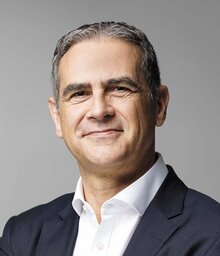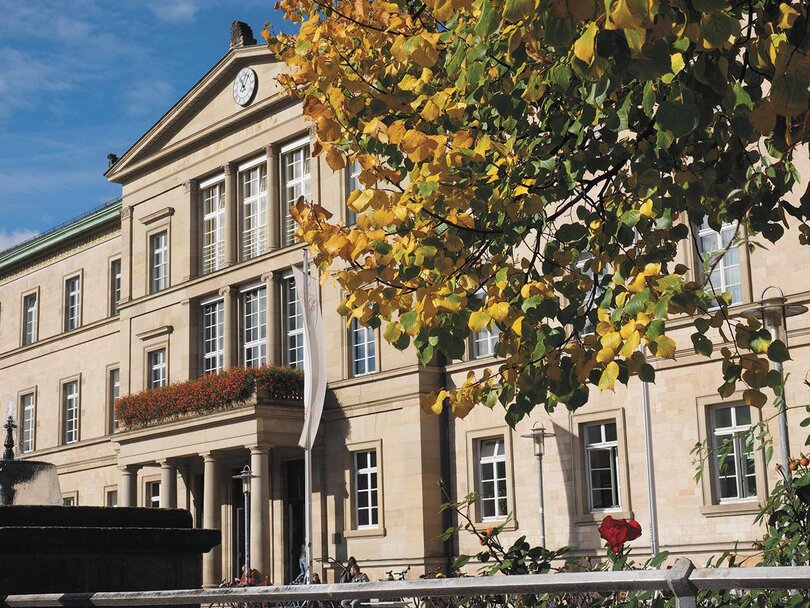«Erasmus had a major impact on my professional life»

Gilles Roux was an Erasmus student at the University of Tübingen in 1990 during his law studies at the University of Aix-en-Provence. He has spent his entire professional life either in Germany or working for German companies abroad.

Gilles Roux studied at the University of Tübingen with Erasmus in 1990.
Monsieur Roux, why did you decide to study abroad with Erasmus at the University of Tübingen in the late 1980s, early 1990s?
Gilles Roux: I had always been fascinated by countries and foreign languages as a child. When I was 18, I got a summer job through the Fondation Entente Franco-Allemande with the German post office in Langen. That was in 1988. The following year, I worked for the post office again, this time in Frankfurt am Main.
It was a fantastic time – love at first sight! And the logical next step for me was to take part in the Erasmus programme in 1990 and benefit from the partnership between the University of Aix-en-Provence and University of Tübingen to complete my Maîtrise in law.
What were your impressions? What lasting experiences did you have?
The first 3 months were difficult. The legal terminology, the different writing style compared to French, even the opening hours of shops on Saturdays were different. In the first few weeks, I had a headache every evening. Nobody had prepared us for a culture shock like that. In 2014, Laurent Fabius said that «Germans are not French people who speak German». I already knew that in 1990.
After these 3 months, everything became easier, because the Germans proved to be very hospitable. They are very Francophile, so doors opened automatically. I joined a German study group and with them I represented Tübingen in the René Cassin Human Rights Award in Strasbourg.
My Erasmus experience was so positive that I stayed in Germany. This year, I celebrate my 34th year as an expat.
Perceived Relevance of the Skills for the Current Position
Responses in percent, N = 13,776
Persons who currently hold a position as employee/civil servant or are self-employed

Would you say that Erasmus was – or became – a turning point in your life?
Erasmus had a major impact on my professional life. Without it, I wouldn’t have had the chance to perfect my German to the level it is today, and indirectly my English, too. Coming from a middle-class family in southern France, I definitely wouldn’t have had the career I have today without Erasmus.
Erasmus also introduced me to a different culture. Throughout my time abroad, I lived, breathed and ate German. Being able to immerse yourself in a culture that isn’t your own helps you grow and makes you open-minded. This is undoubtedly one of Europe’s greatest strengths – and one that should be preserved.
You describe humanism as a key factor in the success of companies. Can you elaborate on this? And how might a programme like Erasmus+ contribute to it?
Today, the success of companies is no longer measured solely by profit but also by their impact on society and the environment. In fact, I would go so far as to say that humanism has become the key factor determining a company’s success.
A humanist company is committed to respecting the well-being of its employees and the environment. A humanist company fosters a sustainable culture, which employees at all levels of the organisation are encouraged to be part of.
By exposing young people to diverse cultures and environments, Erasmus becomes a cornerstone of a European humanist culture. Erasmus students become Europeans who are aware of their national roots, but also embrace a shared European identity that upholds the well-being and dignity of each individual in Europe. This is why Erasmus is, at its core, a humanist initiative.
Would you encourage young people to take part in an Erasmus mobility?
Take a guess! Erasmus is a once-in-a-lifetime opportunity that students shouldn’t miss. However, it is also the responsibility of European countries to actively promote language learning and ensure that young people can fully benefit from Erasmus and the many opportunities Europe offers. While Erasmus opens doors to the future and to mobility, it is the national education systems that hold the keys to making access possible.
The interview was conducted by Marcus Klein.
Gilles Roux was in Germany with Erasmus in 1990/1991.